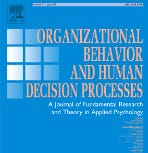New article in OBHDP (March 19th, 2025)
When do people claim to know the unknowable? The impact of informational context on overclaiming
Stav Atir, Emily Rosenzweig, David Dunning
https://www.sciencedirect.com/science/article/abs/pii/S0749597825000020
Many people believe that true knowledge is separating what one knows from what one does not. Although this is a useful skill for managers, and one they would certainly desire their employees to have, an increasing volume of research demonstrates that people sometimes lack awareness of the gaps in their knowledge. They often “overclaim” knowledge they do not (and cannot) have, with myriad organizational consequences. In this article, the authors propose that overclaiming is contextually dependent on the informational environment. They find that people claim more knowledge of concepts that do not exist when they appear among familiar (versus unfamiliar) concepts. For example, if nonexistent finance terms (e.g., rule of dividend yield, reversed index) are presented alongside well-known finance concepts (e.g., bond, debt, annuity), people are more likely to claim to know those nonexistent terms than if they are presented alongside lesser-known finance concepts (e.g., hurdle rate, realized volatility). This effect is mediated by a self-inference process, whereby familiarity with real concepts leads people to infer they are knowledgeable on the topic. In turn, people infer they also know nonexistent concepts ostensibly related to the topic. The authors find support for their proposals across seven studies using a variety of contexts. These results indicate that managers and employees need to be wary of relying on their intuition about the extent of their knowledge.
P.S. if you can’t access the full-text let us (m-kouchaki@kellogg.northwestern.edu or mikebaer@asu.edu) know and we’d be happy to share a copy.


